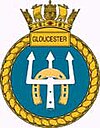| Revision as of 17:55, 22 June 2011 edit86.130.2.105 (talk)No edit summary← Previous edit | Revision as of 14:01, 27 June 2011 edit undo217.207.120.206 (talk) →DecommissioningNext edit → | ||
| Line 96: | Line 96: | ||
| ==Decommissioning== | ==Decommissioning== | ||
| HMS ''Gloucester'' returned to ] for the final time on 23 May 2011 to await decommissioning.<ref name="Saxon Warrior"/> | HMS ''Gloucester'' returned to ] for the final time on 23 May 2011 to await decommissioning on 30th June 2011.<ref name="Saxon Warrior"/> | ||
| ==Affiliations== | ==Affiliations== | ||
Revision as of 14:01, 27 June 2011
For other ships with the same name, see HMS Gloucester.| This article needs additional citations for verification. Please help improve this article by adding citations to reliable sources. Unsourced material may be challenged and removed. Find sources: "HMS Gloucester" D96 – news · newspapers · books · scholar · JSTOR (June 2008) (Learn how and when to remove this message) |
 HMS Gloucester HMS Gloucester
| |
| History | |
|---|---|
| Name | HMS Gloucester |
| Operator | Royal Navy |
| Builder | Vosper Thornycroft |
| Laid down | 29 October 1979 |
| Launched | 2 November 1982 |
| Sponsored by | Birgitte, Duchess of Gloucester |
| Commissioned | 11 September 1985 |
| Identification | list error: <br /> list (help) Pennant number: D96 Deck code: GL International callsign: GBBF |
| Motto | Prorsum ("Onwards") |
| Nickname(s) | "The Fighting G" |
| Status | Awaiting decommissioning |
| Badge | list error: <br /> list (help) On a Field Blue a Trident White enfiled by a horseshoe gold  |
| General characteristics | |
| Class and type | Type 42 destroyer |
| Displacement | 5,200 tonnes |
| Length | 141 m (462.5 ft) |
| Beam | 15.2 m (50 ft) |
| Propulsion | list error: <br /> list (help) COGOG (Combination of Gas or Gas) turbines, 2 shafts 2 turbines producing 36 MW |
| Speed | 30 knots (56 km/h) |
| Complement | 287 |
| Armament |
|
| Aircraft carried | list error: mixed text and list (help) 1 x Lynx HMA8 Armed with
|
HMS Gloucester is a Batch 3 Type 42 destroyer of the Royal Navy. The ship was built by Vosper Thorneycroft at Woolston, Southampton and launched on 2 November 1982 by The Duchess of Gloucester. The present HMS Gloucester was one of the last four of the class to be built. They have a lengthened hull design giving better seakeeping qualities and greater endurance. The flight deck recognition letters worn by HMS Gloucester are GC, and her international callsign is GBBF.
Operational history
Gloucester served in the Gulf War in 1991 under the command of Commander (later Rear Admiral) Philip Wilcocks where her most notable action was the firing of a salvo shot of Sea Dart missiles to shoot down two Iraqi Silkworm missiles that were threatening the USS Missouri and allied minehunters; the first (and only) successful missile vs missile engagement at sea in combat by any Navy. The ship also survived attacks from two sea mines and conducted numerous boardings using her boarding party consisting of Royal Navy and Royal Marine personnel. The ship's Lynx helicopter destroyed numerous Iraqi warships. She spent the longest period upthreat of any coalition warship. As a result of her endeavours, her Captain (Commander Philip Wilcocks) and Flight Commander (Lt Cdr David Livingstone) were decorated with the Distinguished Service Cross; the Operations Officer and Flight Observer were both mentioned in Despatches. After this service HMS Gloucester was rebranded with her nickname of The Fighting G.
During the 2006 Israel-Lebanon conflict, HMS Gloucester was the first Royal Navy vessel to evacuate British nationals from Beirut, docking on 18 July 2006. She made three trips taking evacuees to Cyprus, and was the last Royal Navy ship to leave Beirut. She underwent a £6 million refit at Rosyth Dockyard in Fife, Scotland, in 2007. On the morning of 26 August 2010 she intercepted the yacht Tortuga, smuggling £4 million of cocaine, during the Gloucester 's voyage out to the Falkland Islands, where she was deployed from August 2010 to early 2011. On 20 September 2010 the government of Uruguay denied HMS Gloucester access to Montevideo as a result of the Falkland Islands sovereignty dispute.
In May 2011, she took part in exercise Saxon Warrior.
Decommissioning
HMS Gloucester returned to HMNB Portsmouth for the final time on 23 May 2011 to await decommissioning on 30th June 2011.
Affiliations
The ship retains links with the Royal Gloucestershire, Berkshire and Wiltshire Regiment and the City of Gloucester. The ship's crest features a horseshoe, part of the City's Tudor Arms.
- The Rifles
- City of Gloucester
- Worshipful Company of Grocers
- Gloucester R.F.C.
- 2nd Durrington Sea Scout Group
- Gloucester Royal Naval Association
References
- "Royal Navy Bridge Card, February 2009" (PDF). Retrieved 2009-06-20.
- "Praise for UK Lebanon evacuation". BBC News. 3 August 2006.
- Bowcott, Owen (30 August 2010). "Royal Navy warship intercepts yacht carrying cocaine worth £4m". The Guardian. London.
- Infobae. 20 September 2010 http://www.infobae.com/mundo/537520-101275-0-Uruguay-le-nego-la-entrada-un-buque-la-Armada-britanica-que-se-dirigia-las-Malvinas.
{{cite news}}: Missing or empty|title=(help) - "Uruguayan gov't bans British heading-to-Malvinas vessel from entering Montevideo's port". Buenos Aires herald. 20 September 2010.
- ^ http://www.navynews.co.uk/news/1195-george-bush-bound-for-portsmouth-after-war-games-with-royal-navy.aspx
Gallery
-
 HMS Gloucester leaving Portsmouth
HMS Gloucester leaving Portsmouth
-
 HMS Gloucester leaving Portsmouth
HMS Gloucester leaving Portsmouth
External links
| Type 42 destroyers | |
|---|---|
Hércules class | |
| |
| Aircraft carriers |
| ||||||||
|---|---|---|---|---|---|---|---|---|---|
| Submarines |
| ||||||||
| Destroyers |
| ||||||||
| Frigates |
| ||||||||
| Amphibious warfare ships |
| ||||||||
| Mine counter measures vessels |
| ||||||||
| Patrol vessels |
| ||||||||
| Survey vessels |
| ||||||||
| Miscellaneous |
| ||||||||